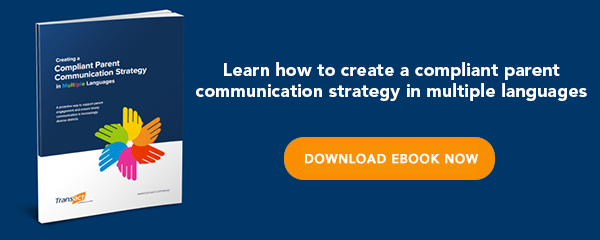U.S. Secretary of Education Betsy DeVos has posted "A Parent Guide to State and Local Report Cards" on the U.S. Department of Education's (USED) website.
Read MoreDeVos Posts "A Parents Guide to ESSA State and Local Report Cards"
New ESSA RoadMap Now Available
The School Support and Improvement ESSA RoadMap is now available.
Read MoreU.S. Department of Education Releases Parent Guide to Understanding ESSA
The U.S. Department of Education (USED) announced the release of the document, "Understanding the Every Student Succeeds: A Parent Guide to the Nation's Landmark Education Law" on October 4, 2018. The announcement describes this guide as "a parent and guardian-friendly guide to the important flexibilities in the Every Student Succeeds Act (ESSA)." When TransACT drafted its ESSA notices, they were written using the guidelines of the Plain Writing Act of 2010. According to the USED announcement, this parent guide was also written following those guidelines.
Read MoreParent Communications and Translations: Machine vs. Human Translation – What’s the Difference?
Proactive schools and school districts are finding and using all means available to communicate with parents, including English learner (EL) students and parents with limited English proficiency (LEP). In an article from District Administration titled “Tech: A language translator allows districts to reach out to ELLs”, a number of creative and innovative solutions are discussed. This includes the use of machine translation (computer-assisted translation) tools, such as Google Translate.
Read MoreDr. David Holbrook Joins Ellevation's Highest Aspirations Podcast, S01 E17: ESSA's Impact on ELL Programs
This blog has been modified from its original version, which appeared in the Ellevation blog.
Read MoreParent Notices product update: changes to the Summary, Checklist & Timelines parent notice tracking tool
"Parent Notifications Summary, Checklist & Timelines" is a resource to help educators identify the important parent notification distribution, timelines, and responsibilities. This document is provided to TransACT ParentNotices customers with an active subscription to the ESEA (ESSA) ParentNotices Collection. In August of 2018, this resource was updated with a new title and guidance.
Read MorePress Release: South Carolina Department of Education Partners with ActPoint KPI for Food Services Management with Software
The South Carolina Department of Education (SCDE) and TransACT Communications are announcing a partnership with South Carolina School Food Authorities (SFA’s) and ActPoint® KPI, a Key Performance Indicator (KPI) analytics system to help manage high quality food services programs.
Read MoreGuest Blog: Understanding the Impact of Historical Trauma for the Education of Native American Children
As part of our commitment to provide school district administrators with resources and guidance on federal program compliance and administration, we regularly publish blogs featuring guest writers. We are honored to feature a co-written article between TransACT Executive Director of Federal Compliance and State Relationships, Dr. Holbrook, and his former colleague Keja Nokomis Whiteman,
an enrolled member of the Turtle Mountain Band of Chippewa Indians discussing the importance of incorporating cultural history to support positive learning outcomes for Native Americans.
I was motivated to initiate the writing of this blog when I saw a news story via Politico about the return of the remains of four Native American children from the graveyard associated with the Carlisle Indian Industrial School, one of the boarding schools that were part of past attempts to forcibly assimilate Native Americans into the dominant American culture. The mortality rate for Native American students at this school was approximately 2%. The school operated from 1879 through 1918 and over that time period housed about 10,000 students.
Read MoreTransACT Director of Federal Programs and State Relationships to Serve on Advisory Board for Ellevation
TransACT Communications, the leader in parent engagement compliance, is proud to announce that Executive Director for Federal Compliance and State Relationships, Dr. David Holbrook, will serve as a policy adviser for the Ellevation Advisory Board. In this role, which is the first of its kind at Ellevation, Dr. Holbrook will help the Ellevation ELL community understand the impact of the Every Student Succeeds Act (ESSA) of 2015 on the work of English Language Learner (ELL) educators and their students.
Read MoreDr. David Holbrook Selected to be Executive Director for the National Council of State Title III Directors (NCSTIIID)
TransACT’s Executive Director for Federal Compliance and State Relationships, Dr. David Holbrook, has been selected to serve as the Executive Director of the National Council of State Title III Directors (NCSTIIID). In this role, David will be responsible for guiding the board and its activities associated with advocacy for English Learners and immigrant students.
Read MorePOSTS BY TOPIC
- ESSA (107)
- Parent Engagement (69)
- EL (59)
- Civil Rights (43)
- USED (19)
- KPI (15)
- Operations Performance (12)
- McKinney-Vento (10)
- Transportation (7)
- charter schools (5)
- compliance software (5)
- homelessness (4)
- ARP (3)
- American Rescue Plan (3)
- CARES Act (3)
- CRRSA (3)
- Corporate/Product News (3)
- ESSER (3)
- Education (3)
- HIMSS (3)
- Native American Education (3)
- Student Support (3)
- After School Programs (2)
- CGCS (2)
- COVID (2)
- CRRSA Act (2)
- Charter School Governance Platform (2)
- Charter School Leaders (2)
- OST (2)
- School Communication Plan (2)
- Student Success (2)
- Substitute Teacher Training (2)
- 21CCLC (1)
- AI (1)
- Artificial Intelligence (1)
- Board Meetings (1)
- Cloud Technologies (1)
- DACA (1)
- Data Compliance (1)
- Release Notes (1)
- Routing (1)
- charter board ceo (1)
- charter school staff (1)



